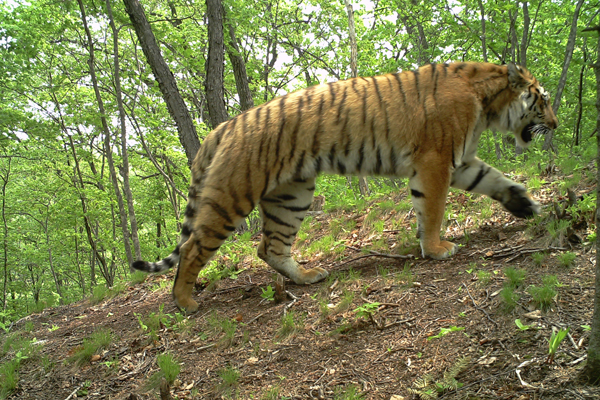China's Siberian tigers come in from the cold
China Daily ,08/15, 2017 Adjust font size:
 |
A Siberian tiger photographed in Hunchun, Jilin province, in2015. [Photo/China Daily] |
The number of big cats in the northeastern province is rising after decades of conservation efforts, as Zhang Zefeng reports from Hunchun, Jilin.
One evening in July last year, Yang Yongsheng was washing his feet in a creek near his home in the mountains when he noticed a Siberian tiger staring at him from a bush about 3 meters away.
Suddenly something that had puzzled Yang for a few days became clear."The tiger did it," thought the resident of Yilinangou, a village under the jurisdiction of Hunchun, Jilin province, Northeast China.
"It" was the fact that on three consecutive nights, dogs Yang kept to guard his yard had gone missing. The three leashes that held them to posts had been torn apart.
Yang rushed home, grabbed his smartphone and returned to the spot, where he managed to take several photos of the tiger. A month later, the animal returned and killed another dog.
A year later, with the help of his son, Yang has installed surveillance cameras at his house, focused on the yard. Despite that, the76-year-old villager is still concerned about his safety.
"If the tiger shows up again, I could be a victim," he said."Tiger numbers, along with their areas of activity, have increased significantly in recent years."
In the late1990s, Jilin began a project to protect its natural forests, and established several nature reserves to conserve wildlife habitats. In2015, commercial logging was banned in the province's key State-owned forests to assist the recovery of woodland resources.
"Those efforts fundamentally alleviate the conflict between timber production and the tigers' need for habitats," said Wu Zhigang, a researcher at the Jilin Provincial Academy of Forestry Science.
According to the latest data from the State Forestry Administration, during the late1990s there were at most14 Siberian tigers and10 Amur leopards in the Changbai Mountains, which run along China's border with the Democratic People's Republic of Korea.
Now the figures are27 and42 respectively, and a number of cubs have also been spotted.
As the number of endangered species rises, the Jilin government has been exploring innovative solutions to settle conservation problems in nature reserves and create an animal-friendly environment.
Compensation
Early one morning last month, Jia Cunzeng received a call from a neighbor telling him that one of the cows he tended had been found dead at the foot of a mountain where Siberian tigers and other animals live.